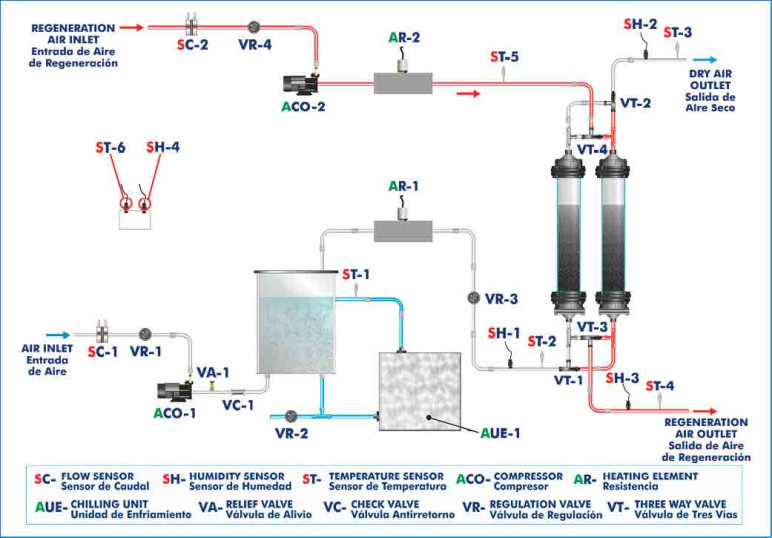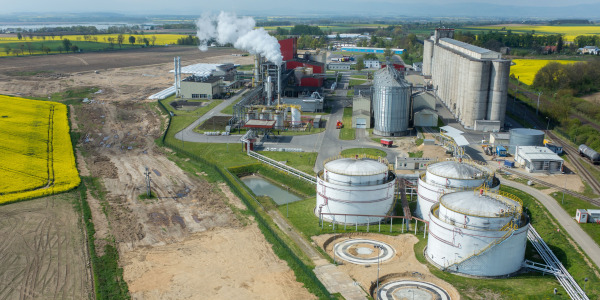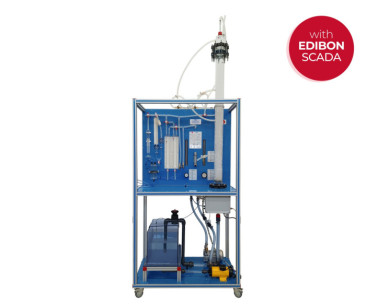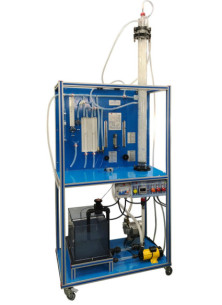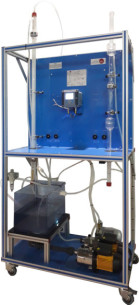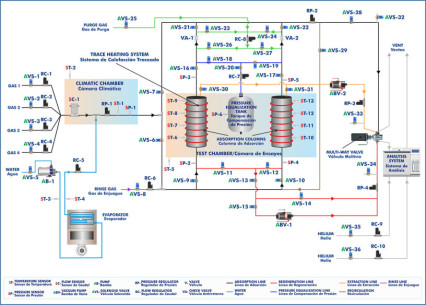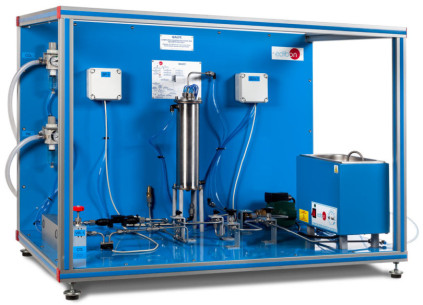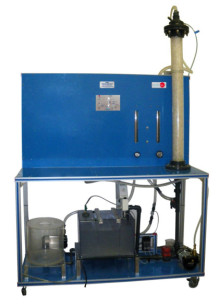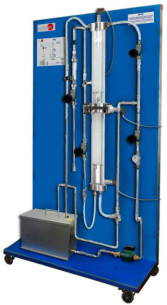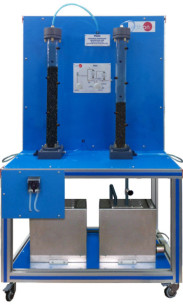QSAC Gerät zur Lufttrocknung durch Adsorption, computergesteuert (PC)
INNOVATIVE SYSTEME
The Computer Controlled Adsorptive Air Drying Unit, "QSAC", unit consists of a damp air drying plant by adsorption through a process of continuous regeneration of the adsorbent with transparent columns.
Erweiterungen
Laboratorien
ÄHNLICHE NEUIGKEITEN
ALLGEMEINE BESCHREIBUNG
The Computer Controlled Adsorptive Air Drying Unit, "QSAC", unit consists of a damp air drying plant by adsorption through a process of continuous regeneration of the adsorbent with transparent columns.
It is formed by two different circuits, each powered by its own compressor and heated by its own heat exchanger, and each one has a column that can be used for both adsorption and desorption.
For the adsorption process, a compressor, controlled by the computer, is used to transport ambient air from the environment to the process inlet. This flow can also be controlled by means of a valve. The air is directed towards a humidifier to reach its maximum relative humidity. The humidifier consists of a water bath, which is cooled by a refrigerating unit and a pump, to drive the cooled fluid to the water bath to maintain the temperature stable. This temperature is controlled by means of a PID control.
At the outlet of the humidifier, the air reaches a heat exchanger where it is heated to regulate the temperature and the relative humidity of the air, which is controlled by means of a PID control.
The wet air enters the adsorption column through the bottom and passes through the adsorbent (silica gel), which is arranged in a transparent column as a fixed bed. The adsorbent adsorbs all moisture from the air and has a colorimetric indicator to facilitate identification of the mass transfer zone (MTZ).
The dry air leaves the column through the top and goes outside.
For the regeneration process, a second compressor, controlled by the computer, is used to transport the air from the environment to the process. This flow can also be controlled by means of a valve. The air is heated by a second heat exchanger, which acts as a heating unit, to regulate its temperature. This temperature is controlled by means of a PID control.
The hot regeneration air enters the second adsorption column through the top and desorption takes place. The loss of color of the mass transfer zone through the transparent column can be observed.
As it is formed by two columns, the unit allows for loading and regenerating the adsorbent alternately and studying the processes of adsorption and desorption simultaneously. If the adsorbent capacity of one of the columns is exhausted, the wet air will pass through the column with regenerated adsorbent.
Due to the continuous measurement at different relevant points of the relative humidity of the air and of the temperature, a balance can be established between both processes. These values are recorded by the software, which allows the representation of these processes in the enthalpy-specific moisture diagram (h-w) and the log of rupture curves (C-t).
ÜBUNGEN UND GEFÜHRTE PRAKTIKEN
GEFÜHRTE PRAKTISCHE ÜBUNGEN IM HANDBUCH ENTHALTEN
- Study of the basic principle of the adsorption process.
- Study of the basic principle of the desorption process.
- Observation of the adsorption/desorption process by colorimetric indicator.
- Study and analysis of the variables that affect the processes of adsorption and desorption as:
- Flow rates.
- Amount of adsorbent bed.
- Temperature and relative humidity.
- Concentration.
- Representation of rupture curves and determination of the rupture time and the breaking and saturation point.
- Representation of the processes in the Mollier diagram of enthalpy versus the specific humidity for the humid air.
- Representation and calculation of the mass transfer zone.
- Sensors calibration.
MEHR PRAKTISCHE ÜBUNGEN FÜR DAS GERÄT
- Many students view results simultaneously. To view all results in real time in the classroom by means of a projector or an electronic whiteboard.
- Open Control, Multicontrol and Real Time Control. This unit allows intrinsically and/or extrinsically to change the span, gains, proportional, integral, derivative parameters, etc, in real time.
- The Computer Control System with SCADA and PID Control allow a real industrial simulation.
- This unit is totally safe as uses mechanical, electrical and electronic, and software safety devices.
- This unit can be used for doing applied research.
- This unit can be used for giving training courses to Industries even to other Technical Education Institutions.
- Control of the QSAC unit process through the control interface box without the computer.
- Visualization of all the sensors values used in the QSAC unit process.
- By using PLC-PI additional 19 more exercises can be done.
- Several other exercises can be done and designed by the user.
ERGÄNZENDE AUSRÜSTUNG
Gerät für Gasabsorptionssäule
Gerät für Dünnschicht-Gasabsorptionssäule, computergesteuert (PC)
Gerät für Laborversuche mit Druckwechseladsorption
Gerät für Adsorption mit festem Bett, computergesteuert (PC)
Gaswäscheranlage, computergesteuert (PC)
Gerät für das Studium des Flusses in Füllstoffsäulen, computergesteuert (PC)
Gerät für Adsorption, computergesteuert (PC)
QUALITÄT

KUNDENDIENST

 Cookie-Präferenzen
Cookie-Präferenzen

